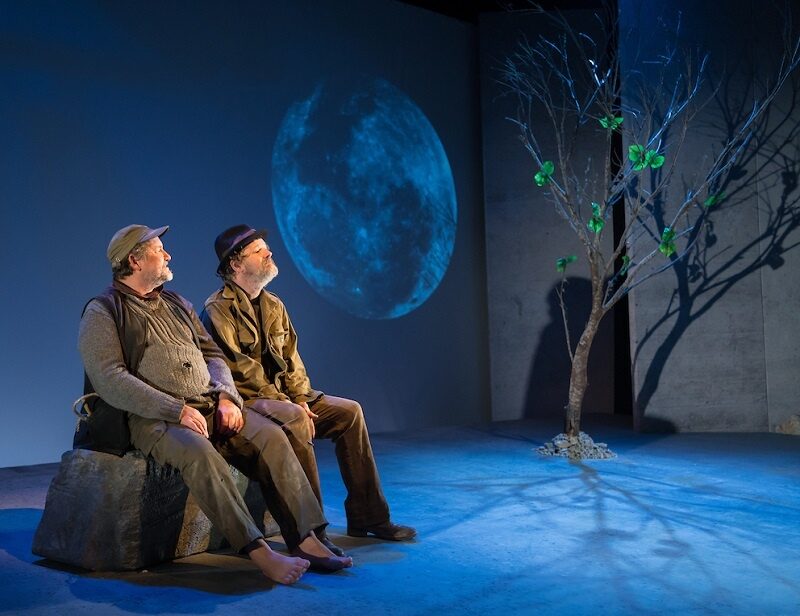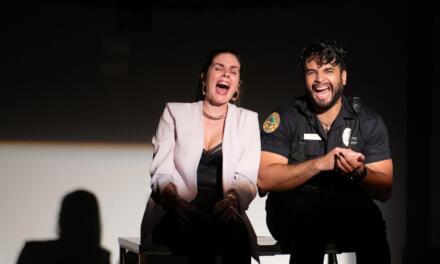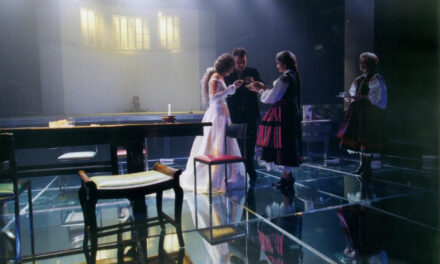Vladimir and Estragon, who nickname each other Didi and Gogo, languish nowhere in particular and do nothing of consequence while waiting for ‘Godot’ to arrive and … what? Reveal his plan for them? Who knows? They never articulate what they expect. As fatalists, they claim no agency in fashioning their future yet share an abiding faith that Godot will eventually honor his promise to come.
In its dramatization of two Determinists[i] trapped in an Existential[ii] universe, therefore, Waiting for Godot is an absurdist joke – either whimsical or cruel depending on your viewpoint. (Has Lotto, I wonder, been named as a play on Godot?)
Between the World Wars, Irish writer Samuel Beckett (also a champion athlete and excellent cricketer) worked as James Joyce’s secretary and published two novels and the odd short story. Postwar, Beckett’s biographer Anthony Cronin tells us, he was either unknown or forgotten; “he already had four unpublished novels and an unproduced play piled up in his apartment” when he wrote Godot, “quickly and with hardly any corrections in a child’s school exercise book in the winter of 1948-49.” Beckett described it as “a relaxation from the rather awful prose I was writing at the time,” and considered it “a marvelous, liberating diversion.”[iii]
Subtitled ‘a tragicomedy in two acts’, Beckett wrote it first in French – En attendant Godot – and then translated it into English. Four years later the French version premiered in Paris and the English premiere, directed by a young Peter Hall, stunned London in 1955.[iv]
Literary critic Vivian Mercier famously revealed (in The Irish Times) that Waiting for Godot was “a play in which nothing happens, twice.” I imagine that pleased Beckett, given his 1951 novel Murphy Dies contains the immortal line “Nothing is more real than nothing.” The opening line of Godot, “Nothing to be done”, recurs throughout. The final lines and stage direction, which have also recurred, are: “Shall we go?”, “Yes, let’s go.”; They do not move.
Apparently, the British actor Robert Morley, brooding in his bath, concluded “that the success of Waiting for Godot means the end of the theatre as we know it,” which may also have delighted Beckett. Likewise, New York Times critic Brooks Atkinson’s calling it “a mystery wrapped in an enigma” (paraphrasing Winston Churchill’s description of Russia). Not that Beckett suffered critics gladly. An increasingly savage exchange of insults that Gogo and Didi engage in to pass the time climaxes with the ultimate blow: “Crrritic!”
It is 20 years since Ross Jolly directed the memorable Circa production of Waiting for Godot in which Ken Blackburn and Peter Vere-Jones delivered (as I wrote in the National Business Review, 1 October 1999) “a tour-de-force of pain-sourced humor and pathos.” Wellington was next treated to the classic in 2010 with a touring production from London’s Theatre Royal Haymarket Company, set in the ruins of a Music Hall theatre (bombed in The Blitz?) and featuring Sir Ian McKellen and Roger Rees. “The loudness of our laughter is equal and opposite to the depth of the anguish we feel within,” I wrote (on 1 July in Theatreview).
So how does this new Circa Theatre production, also directed by Ross Jolly, follow acts like that? Although Beckett has famously stipulated no-one can mess with his text, design choices invariably distinguish each production.
The set is described in the script as: A country road. A tree. Evening. Designer Andrew Foster gives us a clean pale grey slightly raked stage with clean pale grey side panels against a clean pale grey cyclorama. A grey concrete block serves as the low mound, to be sat upon. The tree stands bare in a neat clutch of stones – and is clearly not capable of supporting Estragon’s suggestion that they could hang themselves. Whether that has intended meaning or not is up to us to decide, as with every beat of the play. There is little to indicate a road, as such, let alone that Vladimir and Estragon are consigned to the verge or the ditch alongside.
Lighting designer Marcus McShane bathes the set in even daylight, uses the tree’s shadow to suggest different times of day, gives the cyc a hint of warm glow to indicate daytime and dramatically plunges the stage into twilight, with a fast moon rising (impeccably operated by Deb McGuire).
Sheila Horton’s contemporary costume designs clothe the duo as if they were homeless in Courtenay Place or Cuba Mall. Vladimir, in a multi-pocketed tan jacket, is marginally neater than the shabby grey Estragon. Later the pompous landowner Pozzo appears crisply suited in autumnal orange with a dark brown shirt, silver chain glinting on his chest, and an extraordinary pair of multi-colored shoes. His slave, the hapless Lucky, is punked-out with torn black jeans, a dark baggy t-shirt that harbors hints of skulls, a waistcoat, and a black felt hat. The hats are worn by all four complete the eloquent statements of social status and personality. The Boy who comes with a message from Mr. Godot (that he won’t come this evening but will come tomorrow) wears a light hoodie and calf-length pants. And both Lucky and the Boy have bleached blonde hair – make of that what we will.
Jeff Kingsford-Brown convincingly embodies Estragon/Gogo’s self-involved emotional states from despair to brief delight and back again. Constantly pre-occupied with his boots, oblivious of how much they smell, and desperately wanting to sleep, it is he who keeps suggesting they go far away from here or hang themselves.
Andrew Foster’s Vladimir/Didi, more intent on thinking (to prove he exists?), attempts to maintain an arms-length distance, believing Gogo would be lost without him. He keeps checking his hat in the apparent hope some mystery will reveal itself there, and it is he who keeps on having to remind Gogo they cannot go because they are waiting for Godot. Only occasionally does his relative objectivity give way to a plaintive, “Help me!”
A complete change of tone comes with the arrival of Pozzo and Lucky. Peter Hambleton is every inch the privileged pontificator, lording it over the vagrants as he deigns to divert himself with their company. His mindless mistreatment of his baggage-laden and rope-tethered slave is obscene and, as played by Jack Buchannan, Lucky’s numbed acceptance of his lot is disturbing. The breakout moment comes when Lucky obeys the command to dance then speak: a chaotically dynamic sequence, simultaneously nonsensical yet eloquent, that earns Buchannan spontaneous applause on opening night.
In welcome contrast to the adult characters, the messenger Boy, as played this opening night by Alex Buyck (who will alternate with Alex Usher), is attentive, polite and self-assured.
All five actors inhabit their roles utterly, lifting what looks like difficult text on the page into an entirely convincing display of flawed human behavior.
Although the second act is much like the first, the differences are significant. Bright green leaves on the tree suggest there is hope for a fresh new start. What is implied about the wider world suggests Vladimir and Estragon may have found a degree of sanctuary where they wait. It is Estragon who gets beaten each night by unknown assailants. And it is Estragon who relishes the opportunity to kick the prone Lucky when he and Pozzo – now blind and pathetically dependent on the kindness of strangers – return. So much for optimism.
While Biblical references abound, and Godot is described as having a white beard, Beckett wilfully subverts any attempt to find a unified and coherent allegory or metaphor in the play as a whole. Yet the action and inaction – as orchestrated by director Jolly and skilfully nuanced by the actors – is riddled with vivid snapshots of the human condition. You would have to have lived a very sheltered and complacent life not to catch glimpses of yourself or the world around you.
That said, I cannot say I am moved to empathize with the plights of these men; nor am I shocked into loud laughter. The opening night audience is very attentive and we applaud with admiration and appreciation, but I do miss the previously experienced extremities of humor and pathos. This arguably leaves more room for more objective thought about man’s inhumanity to man, and personal responsibility and resilience. I cannot help but wonder, however, whether such dispassionate viewing is mutually exclusive to drawing more on the play’s inherent opportunities for vaudevillian humor or classical clowning in the French tradition.
[i] Determinism: the belief that all actions and events result from other actions, events, or situations, so people cannot, in fact, choose what to do.
[ii] Existentialism: a philosophical theory emphasizing that people are responsible for their own actions and free to choose their development and destiny.
[iii] https://www.independent.ie/opinion/analysis/a-play-in-which-nothing-happens-twice-26227975.html
[iv] Sir Peter Hall recalls the event in The Guardian: https://www.theguardian.com/stage/2003/jan/04/theatre.beckettat100
This post was written by the author in their personal capacity.The opinions expressed in this article are the author’s own and do not reflect the view of The Theatre Times, their staff or collaborators.
This post was written by John Smythe.
The views expressed here belong to the author and do not necessarily reflect our views and opinions.


















